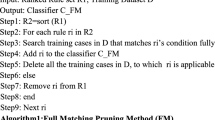Abstract
Associative classification method applies association rule mining technique in classification and achieves higher classification accuracy. However, it is a known fact that associative classification typically yields a large number of rules, from which a set of high quality rules are chosen to construct an efficient classifier. Hence, generating, ranking and selecting a small subset of high-quality rules without jeopardizing the classification accuracy is of prime importance but a challenging task indeed. This paper proposes lazy learning associative classification method, which delays processing of the data until a new sample needs to be classified. This proposed method is useful for applications where the training dataset needs to be frequently updated. Experimental results show that the proposed method outperforms the CBA method.
Access this chapter
Tax calculation will be finalised at checkout
Purchases are for personal use only
Preview
Unable to display preview. Download preview PDF.
Similar content being viewed by others
References
Agrawal, R., Srikant, R.: Fast algorithms for mining association rule. In: Proceedings of the 20th International Conference on Very Large Data Bases, pp. 487–499 (1994)
Baralis, E., Torino, P.: A lazy approach to pruning classification rules. In: Proceedings of the 2002 IEEE International Conference on Data Mining (ICDM 2002), Maebashi City, Japan, pp. 35–42 (2002)
Baralis, E., Chiusano, S., Graza, P.: On support thresholds in associative classification. In: Proceedings of the 2004 ACM Symposium on Applied Computing, pp. 553–558. ACM Press, Nicosia (2004)
Baralis, E., Chiusano, S., Garza, P.: A Lazy Approach to Associative Classification. IEEE Transactions on Knowledge and Data Engineering 20(2), 156–171 (2008)
Blake, C.L., Merz, C.J.: UCI Repository of machine learning databases (1998)
Dong, G., Zhang, X., Wong, L., Li, J.: CAEP: Classification by Aggregating Emerging Patterns. In: Proc. Second Int’l Conf. Discovery Science (December 2009)
Chen, G., Liu, H., Yu, L., Wei, Q., Zhang, X.: ‘A new approach to classification based on association rule mining’. Science Direct, Decision Support Systems 42, 674–689 (2006)
Han, J., Pei, J., Yin, Y.: Mining frequent patterns without candidate generation. In: Proceedings of the 2000 ACM SIGMOD International Conference on Management of Data, pp. 1–12. ACM Press, Dallas (2000)
Han, J., Kamber, M.: Data Mining: Concepts and Techniques. Morgan Kaufmann Publishers, New York (2001)
Li, W., Han, J., Pei, J.: CMAR: Accurate and Efficient Classification Based on Multiple Class-Association Rules. In: Proc. IEEE Int’l Conf. Data Mining, ICDM 2001 (November 2001)
Liu, B., Hsu, W., Ma, Y.: Integrating Classification and Association Rule Mining. In: Proceedings of the Fourth International Conference on Knowledge Discovery and Data Mining, pp. 80–86 (1998)
Merschmann, L., Plastino, A.: HiSP-GC: A Classification Method Based on Probabilistic Analysis of Patterns. Journal of Information and Data Management 1(3), 423–438 (2010)
Merschmann, L., Plastino, A.: A lazy data mining approach for protein classification. IEEE Transactions on Nanobioscience 6(1), 36–42 (2007)
Syed Ibrahim, S.P., Chandran, K.R., Jabez Christopher, J.: An Evolutionary Approach for Ruleset Selection in a Class Based Associative Classifier. European Journal of Scientific Research 50(3), 422–429 (2011) ISSN 1450-216X
Syed Ibrahim, S.P., Chandran, K.R., Jabez Christopher, J.: A Comparison Of Associative Classifiers. In: The Conference On Research Issues In Engineering And Technology (Computer Science And Engineering Stream), Organized by PSG College of Technology, Coimbatore, India, April 28 (2011)
Syed Ibrahim, S.P., Chandran, K.R., Muniasamy, R.: Efficient Rule Ranking And Rule Pruning In Associative Classification. In: The Conference On Research Issues In Engineering And Technology (Computer Science And Engineering Stream), Organized by PSG College of Technology, Coimbatore, India, April 28 (2011)
Abdeljaber, T.F.: A review of associative classification mining. Knowledge Engineering Review 22(1), 37–65 (2007)
Yin, X., Han, J.: CPAR: Classification Based on Predictive Association Rules. In: Proc. Third SIAM Int’l Conf. Data Mining (SDM 2003) (May 2003)
Author information
Authors and Affiliations
Editor information
Editors and Affiliations
Rights and permissions
Copyright information
© 2011 Springer-Verlag Berlin Heidelberg
About this paper
Cite this paper
Ibrahim, S.P.S., Chandran, K.R., Nataraj, R.V. (2011). LLAC: Lazy Learning in Associative Classification. In: Abraham, A., Lloret Mauri, J., Buford, J.F., Suzuki, J., Thampi, S.M. (eds) Advances in Computing and Communications. ACC 2011. Communications in Computer and Information Science, vol 190. Springer, Berlin, Heidelberg. https://doi.org/10.1007/978-3-642-22709-7_61
Download citation
DOI: https://doi.org/10.1007/978-3-642-22709-7_61
Publisher Name: Springer, Berlin, Heidelberg
Print ISBN: 978-3-642-22708-0
Online ISBN: 978-3-642-22709-7
eBook Packages: Computer ScienceComputer Science (R0)




